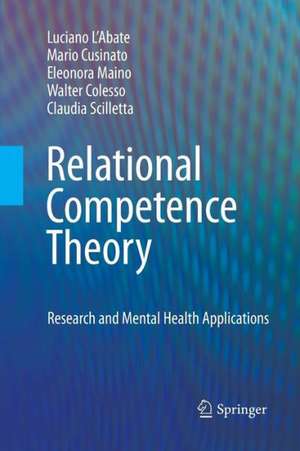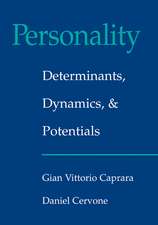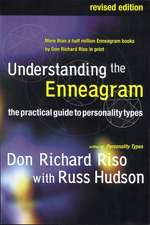Relational Competence Theory: Research and Mental Health Applications
Autor Luciano L'Abate, Mario Cusinato, Eleonora Maino, Walter Colesso, Claudia Scillettaen Limba Engleză Paperback – 19 sep 2014
- Socialization settings for relational competence.
- The ability to control and regulate the self.
- Relationship styles.
- Intimacy and negotiation.
- The use of practice exercises in prevention and treatment of pathology.
- Appendices featuring the Relational Answers Questionnaire and other helpful tools.
Relational Competence Theory both challenges and confirms much of what we know about the range of human relationships, and is important reading for researchers, scholars, and students in personality and social psychology, psychotherapy, and couple and family counseling.
| Toate formatele și edițiile | Preț | Express |
|---|---|---|
| Paperback (1) | 642.83 lei 6-8 săpt. | |
| Springer – 19 sep 2014 | 642.83 lei 6-8 săpt. | |
| Hardback (1) | 649.06 lei 6-8 săpt. | |
| Springer – 22 iun 2010 | 649.06 lei 6-8 săpt. |
Preț: 642.83 lei
Preț vechi: 756.27 lei
-15% Nou
Puncte Express: 964
Preț estimativ în valută:
123.01€ • 128.69$ • 102.18£
123.01€ • 128.69$ • 102.18£
Carte tipărită la comandă
Livrare economică 03-17 aprilie
Preluare comenzi: 021 569.72.76
Specificații
ISBN-13: 9781489982087
ISBN-10: 1489982086
Pagini: 344
Ilustrații: XVII, 326 p.
Dimensiuni: 155 x 235 x 18 mm
Greutate: 0.49 kg
Ediția:2010
Editura: Springer
Colecția Springer
Locul publicării:New York, NY, United States
ISBN-10: 1489982086
Pagini: 344
Ilustrații: XVII, 326 p.
Dimensiuni: 155 x 235 x 18 mm
Greutate: 0.49 kg
Ediția:2010
Editura: Springer
Colecția Springer
Locul publicării:New York, NY, United States
Public țintă
ResearchCuprins
to Relational Competence Theory.- Background for a Hierarchical Theoretical Framework.- Internal and External Measures to Evaluate Models of the Theory.- Metatheoretical Assumptions.- Model1: The Width of Relationships.- Model2: The Depth of Relationships.- Model3: Socialization Settings for Relational Competence.- Theoretical Assumptions.- Model4: Ability To Love.- Model5: Ability To Control and Regulate Self.- Model6: Combination of Both Abilities.- Model7: The Triangle of Living.- Normative Theoretical Models.- Model8: Self-Identity Differentiation.- Model9: Styles in Relationships.- Model10: Interactions in Intimate Relationships.- Model11: Selfhood.- Model12: Priorities.- Clinically Relevant Models.- Model13: Distance Regulation.- Model14: A Pathogenic Drama Triangle.- Model15: Intimacy.- Model16: Negotiation.- The Improvement of Relational Competence.- Promotion of Relational Competence: Approaching Positive Experiences.- Prevention of Relational Incompetence: Avoiding Negative Experiences.- Treatment of Severe Relational Incompetence: One Approach Is Not Enough.- Conclusion.- Fully Functional Relational Competence.
Recenzii
From the reviews:
"This is a scholarly work, both in terms of operationalized research into relationships as well as its major understandings of the human state of relatedness which are difficult to measure or operationalize. The healing of couples and the complexity of intimate human relationships is definitely a challenge.
This book is a fascinating, erudite, and most useful theoretical and practical book for any therapist who wants to understand relationships, priorities, models for commitment. It behoves us to really understand the conscious and unconscious interpersonal and intrapsychic relationships of clients." (Sandra E.S. Neil, Clinical and Family Psychologist, September 2010)
"Through a thorough review of the research that digs deeply into the complexity of human interactions, L'Abate and his colleagues elucidate the concepts of relational competence...This book may become one of the authoritative sources for comprehensive research on social interaction. Luciano L'Abate, the senior author, proves his mettle as one of the hardest working and most productive researchers on human interaction. The references at the back of the book take at least 2 1/2 full pages to list his citations, revealing a man whose research covers the waterfront, from intimacy ("Intimacy is Sharing Hurt Feelings," 1977) through therapy (Beyond Psychotherapy, 2002) to play (The Praeger Handbook of Play across the Life Cycle, 2009)." (David Ryback, The Georgia Psychologist, September 2010)
"...The authors have created a potentially powerful model for understanding relationship competence, and one that deserves wide attention and serious consideration." (James P. Schmidt, PsycCRITIQUES Contemporary Psychology: APA Review of Books, January 2011)
"This is a scholarly work, both in terms of operationalized research into relationships as well as its major understandings of the human state of relatedness which are difficult to measure or operationalize. The healing of couples and the complexity of intimate human relationships is definitely a challenge.
This book is a fascinating, erudite, and most useful theoretical and practical book for any therapist who wants to understand relationships, priorities, models for commitment. It behoves us to really understand the conscious and unconscious interpersonal and intrapsychic relationships of clients." (Sandra E.S. Neil, Clinical and Family Psychologist, September 2010)
"Through a thorough review of the research that digs deeply into the complexity of human interactions, L'Abate and his colleagues elucidate the concepts of relational competence...This book may become one of the authoritative sources for comprehensive research on social interaction. Luciano L'Abate, the senior author, proves his mettle as one of the hardest working and most productive researchers on human interaction. The references at the back of the book take at least 2 1/2 full pages to list his citations, revealing a man whose research covers the waterfront, from intimacy ("Intimacy is Sharing Hurt Feelings," 1977) through therapy (Beyond Psychotherapy, 2002) to play (The Praeger Handbook of Play across the Life Cycle, 2009)." (David Ryback, The Georgia Psychologist, September 2010)
"...The authors have created a potentially powerful model for understanding relationship competence, and one that deserves wide attention and serious consideration." (James P. Schmidt, PsycCRITIQUES Contemporary Psychology: APA Review of Books, January 2011)
Notă biografică
Since his retirement in 1990, Luciano L'Abate, Ph.D. has been Professor Emeritus at Georgia State University where he was previously a Professor of Psychology beginning in 1965. L'Abate has been an editorial board member of many national and foreign professional and scientific journals, as well as a consultant to various publishing houses. He is the author and co-author of over 300 papers, chapters, and book reviews in professional journals in addition to authoring/editing 34 books. His work has been translated into Chinese, Japanese, Finnish, Spanish, French, Polish, and German languages. Dr. L'Abate is the recipient of many awards including "Family Psychologist of the Year for 1994" by Division 43 of the American Psychological Association, "Outstanding Contribution" by the Georgia Association for Marriage and Family Therapy, and "Outstanding Citizen" by the House of Representatives in the State of Georgia. He has also held workshops and lectured extensively in the United States, Australia, Canada, New Zealand, Japan, Germany, Spain, and Italy. Dr. L'Abate has spent the last several years involved full-time in writing and research since his retirement from Georgia State University.
Textul de pe ultima copertă
Relational competence—the set of traits that allow people to interact with each other effectively—enjoys a long history of being recorded, studied, and analyzed. Accordingly, Relational Competence Theory (RCT) complements theories that treat individuals’ personality and functioning individually by placing the individual into full family and social context. The ambitious volume Relational Competence Theory: Research and Mental Health Applications opens out the RCT literature with emphasis on its applicability to interventions, and updates the state of research on RCT, examining what is robust and verifiable both in the lab and the clinic. The authors begin with the conceptual and empirical bases for the theory, and sixteen models demonstrate the range of RCT concerns and their clinical relevance, including:
- Socialization settings for relational competence.
- The ability to control and regulate the self.
- Relationship styles.
- Intimacy and negotiation.
- The use of practice exercises in prevention and treatment of pathology.
- Appendices featuring the Relational Answers Questionnaire and other helpful tools.
Relational Competence Theory both challenges and confirms much of what we know about the range of human relationships, and is important reading for researchers, scholars, and students in personality and social psychology, psychotherapy, and couple and family counseling.
- Socialization settings for relational competence.
- The ability to control and regulate the self.
- Relationship styles.
- Intimacy and negotiation.
- The use of practice exercises in prevention and treatment of pathology.
- Appendices featuring the Relational Answers Questionnaire and other helpful tools.
Relational Competence Theory both challenges and confirms much of what we know about the range of human relationships, and is important reading for researchers, scholars, and students in personality and social psychology, psychotherapy, and couple and family counseling.
Caracteristici
comprehensive theoretical model theory in an evidence-based context implications for therapeutic practice Includes supplementary material: sn.pub/extras















